- Home
- Roxane Gay
Hunger Page 2
Hunger Read online
Page 2
There are things I want to do with my body but cannot. If I am with friends, I cannot keep up, so I am constantly thinking up excuses to explain why I am walking slower than they are, as if they don’t already know. Sometimes, they pretend not to know, and sometimes, it seems like they are genuinely that oblivious to how different bodies move and take up space as they look back at me and suggest we do impossible things like go to an amusement park or walk a mile up a hill to a stadium or go hiking to an overlook with a great view.
My body is a cage. My body is a cage of my own making. I am still trying to figure my way out of it. I have been trying to figure a way out of it for more than twenty years.
8
In writing about my body, maybe I should study this flesh, the abundance of it, as a crime scene. I should examine this corporeal effect to determine the cause.
I don’t want to think of my body as a crime scene. I don’t want to think of my body as something gone horribly wrong, something that should be cordoned off and investigated.
Is my body a crime scene when I already know I am the perpetrator, or at least one of the perpetrators?
Or should I see myself as the victim of the crime that took place in my body?
I am marked, in so many ways, by what I went through. I survived it, but that isn’t the whole of the story. Over the years, I have learned the importance of survival and claiming the label of “survivor,” but I don’t mind the label of “victim.” I also don’t think there’s any shame in saying that when I was raped, I became a victim, and to this day, while I am also many other things, I am still a victim.
It took me a long time, but I prefer “victim” to “survivor” now. I don’t want to diminish the gravity of what happened. I don’t want to pretend I’m on some triumphant, uplifting journey. I don’t want to pretend that everything is okay. I’m living with what happened, moving forward without forgetting, moving forward without pretending I am unscarred.
This is the memoir of my body. My body was broken. I was broken. I did not know how to put myself back together. I was splintered. A part of me was dead. A part of me was mute and would stay that way for many years.
I was hollowed out. I was determined to fill the void, and food was what I used to build a shield around what little was left of me. I ate and ate and ate in the hopes that if I made myself big, my body would be safe. I buried the girl I had been because she ran into all kinds of trouble. I tried to erase every memory of her, but she is still there, somewhere. She is still small and scared and ashamed, and perhaps I am writing my way back to her, trying to tell her everything she needs to hear.
9
I was broken, and to numb the pain of that brokenness, I ate and ate and ate, and then I was not just overweight or fat. Less than a decade later, I was morbidly obese and then I was super morbidly obese. I was trapped in my body, one I made but barely recognized or understood. I was miserable, but I was safe. Or at least I could tell myself I was safe.
My memories of the after are scattered, fragmentary, but I do clearly remember eating and eating and eating so I could forget, so my body could become so big it would never be broken again. I remember the quiet comfort of eating when I was lonely or sad or even happy.
Today, I am a fat woman. I don’t think I am ugly. I don’t hate myself in the way society would have me hate myself, but I do live in the world. I live in this body in this world, and I hate how the world all too often responds to this body. Intellectually, I recognize that I am not the problem. This world and its unwillingness to accept and accommodate me are the problem. But I suspect it is more likely that I can change before this culture and its attitudes toward fat people will change. In addition to fighting the “good fight” about body positivity, I also need to think about the quality of my life in the here and now.
I have been living in this unruly body for more than twenty years. I have tried to make peace with this body. I have tried to love or at least tolerate this body in a world that displays nothing but contempt for it. I have tried to move on from the trauma that compelled me to create this body. I have tried to love and be loved. I have been silent about my story in a world where people assume they know the why of my body, or any fat body. And now, I am choosing to no longer be silent. I am tracing the story of my body from when I was a carefree young girl who could trust her body and who felt safe in her body, to the moment when that safety was destroyed, to the aftermath that continues even as I try to undo so much of what was done to me.
II
10
There is a picture of me. My older cousin is holding me the weekend of my christening. I am still an infant, wearing a long white satin gown. We are sitting on a plastic-covered couch in New York City. In the picture my cousin is older, maybe five or six. I am squirming with senseless baby rage, my limbs at awkward angles.
I am grateful that there are so many pictures of me from my childhood because there is so much I have forgotten in one way or another.
There are years and years of my life I can’t remember a thing about. A family member will say, “Remember the time [insert significant family moment],” and I stare blankly, with no recollection of these moments whatsoever. We have a shared history and yet we do not. In many ways, that’s the best means of describing my relationship with my family, and with nearly everyone in my life. There is the great life we share and the more difficult parts of my life we do not, that they know little about. There is no rhyme or reason to what I can and cannot remember. It’s also hard to explain this absence of memory because there are moments from my childhood I remember like they were yesterday.
I have a good memory. I can remember conversations with friends almost word for word, even years after they occur. I remember how platinum blond the hair of my fourth grade teacher was or how I got in trouble for reading in class in the third grade because I was bored. I remember my aunt and uncle’s wedding in Port-au-Prince and how my knee swelled like an orange after I was bitten by a mosquito. I remember good things. I remember bad things. When I have to, though, I can strip my memory bare, and I have done this, at times, when erasure was necessary.
I have photo albums taken from my parents’ house, albums swollen with fading pictures of my two brothers and me when we were very young. This was before the digital age, and still, it seems like almost every moment of my life was photographed, and then each picture was developed and meticulously archived. Each album has a big number on it with a circle around that number. In many of the albums there are brief notes with names, ages, places. It’s as if my mother knew these memories needed to be preserved for a reason. She raised my brothers and me with iron will and her own kind of grace. The fierceness of her love for and devotion to us is overwhelming, and this fierceness only grows stronger the older we get. When I was a child, my mother kept these albums in a neat, sequential row, and when one album was filled, she went and bought another album and filled it too.
My mother has tried to fill in some of the blanks from my childhood even if she doesn’t realize she’s doing it. She remembers everything, or that’s how it seems, or that’s how it was until I went away to boarding school, at thirteen, and then there was no one there to hold on to my memories for me.
My mom still takes pictures of everything and has more than twenty thousand pictures on her Flickr stream, pictures of her life and our lives and the people and places in our lives. At my doctoral defense, there she was, staring at me so proudly, every few minutes picking up her camera to snap a new picture, to capture every possible second of my moment. At a reading for my novel in New York City, there she was again with her camera, taking pictures, documenting another memorable moment.
People often notice that I take pictures of every little thing. I say I do it so I won’t forget, so I cannot forget, all the amazing things I see and experience. I don’t explain that memories matter more to me now that my life looks different. But it’s more than that. The ways in which I am my mother’s daughter are infinite.
The cover of my baby album is white with specks of glitter throughout. “It’s a girl!” is emblazoned across the cover. On the first page of this album are my parents’ names, my date of birth, my height and weight, hair and eye color. There are two black imprints of my baby feet with the words “Girl Gay” written above them. I was born at 7:48 in the morning, which is why, I am certain, I am not a morning person. There are blank lines for “exciting memories in baby’s life,” and all of those lines have been filled with my first tiny accomplishments. Apparently I read the alphabet at two and a half years old and could tell time at three. My mother proudly wrote, “Reads almost everything at five years old.” Those are her exact words, written in her neat penmanship, though family lore has me reading the newspaper with my dad about a year and a half before that.
For the first five years of my life, my mother recorded my height and weight. I had a big head that was triangular, something that can happen with the firstborn child. My mother says she spent hours smoothing my newborn head into a rounder shape. There was a record of my birth in the Omaha World-Herald, printed on October 28, 1974, thirteen days after my birthday, and the clipped section of the newspaper is stored in this album alongside my original birth certificate and the little card they put on my bassinet in the hospital. My mother was twenty-five and my father was twenty-seven, so young, but, given the era, not as young as many people were when they started families. My name is spelled correctly on my birth certificate, with one n, and the birth certificate is pink. A nuanced cultural understanding of gender did not exist then—girls were pink and boys were blue and that was that.
In the very first picture of my mother and me together, she is holding me and her jet-black hair is cascading down her back in a thick ponytail. She looks impossibly young and beautiful. I am three days old. This is actually not the first picture of us together. There is a picture of my mom, hugely pregnant with me, wearing a sassy blue minidress and a pair of chunky heels. Her hair is wild and hanging loose down her back. She is leaning against a car, giving a look to the photographer, my father, the kind of intimate look that makes me want to turn away to afford them some privacy. She put this picture in the album even though she is one of the most private people I know. She wanted me to see this gorgeous image, to know she and my father have always loved each other.
These oldest pictures have been in the album so long that they are stuck to the pages. To try and remove the pictures would ruin them.
Every picture of me as an infant with my parents reveals them smiling at me like I am the center of their world. I was. I am. This is part of my truth I know with real clarity—everything good and strong about me starts with my parents, absolutely everything. Almost every picture of me as an infant shows me smiling a smile so infectious that when I look at them I cannot help but smile too. There are happy babies and there are happy babies. I was a happy baby. This is indisputable.
Babies are cute, but they’re pretty useless, my best friend says. They can’t do much for themselves. You have to love them through that uselessness. In the pictures where I am alone, I am being propped up by the arm of a chair, or a few pillows. In one picture, on a hideous, thickly brocaded red couch, I am alone and visibly screaming my head off. There is more than one picture of me screaming my head off. Pictures of screaming babies are hilarious when you know they are pictures of happy babies who are simply having a random fit of baby rage. I look at these baby pictures and think, I look like my niece, but really it is my young niece who looks like me. Family is powerful, no matter what. We’re always tied together with our eyes and our lips and our blood and our bloody hearts. When I was three, my brother Joel was born. There are pictures of him, brown and round, a full head of hair, sitting or standing next to me.
As an adult, I have gone through these albums many times. I have been trying to remember. At first, I looked for pictures to show a child of my own, “This is where you come from,” so when I have that child, she might know her family knows how to love, however imperfectly, so she knows her mother has always been loved and so she may know that she, in turn, will always be loved. It is important to show a child love in many forms, and this is the one good thing I have to offer, no matter how this child comes into my life. I also study the pictures, the people in them; I recall the names and places, the moments that matter, so many of which elude me. I try to piece together the memories I have so carefully erased. I try to make sense of how I went from the child in these perfect photographed moments to who I am today.
I know, precisely, and yet I do not know. I know, but I think what I really want is to understand the why of the distance between then and now. The why is complicated and slippery. I want to be able to hold the why in my hands, to dissect it or tear it apart or burn it and read the ashes even though I am afraid of what I will do with what I see there. I don’t know if such understanding is possible, but when I am alone, I sit and slowly page through these albums obsessively. I want to see what is there and what is missing and what happened even if the why still eludes me.
There is a picture of me. I am five. I have big eyes and a scrawny neck. I am staring at a plastic typewriter while I lie on a couch, on my stomach, ankles crossed, probably daydreaming. I always daydreamed. Even then, I was a writer. From an early age, I would draw little villages on napkins and write stories about the people who lived in those villages. I loved the escape of writing those stories, of imagining lives that were different from my own. I had a ferocious imagination. I was a daydreamer and I resented being pulled out of my daydreams to deal with the business of living. In my stories, I could write myself the friends I did not have. I could make so many things possible that I did not dare imagine for myself. I could be brave. I could be smart. I could be funny. I could be everything I ever wanted. When I wrote, it was so easy to be happy.
There is a picture of me. I am seven; I am happy, wearing overalls. I wore overalls a lot as a kid. I liked them for lots of reasons, but mostly I liked them because they had many pockets where I could hide things and because they were complicated and had lots of buttons and things requiring fastening. They made me feel safe, cozy. In probably one out of every three or four pictures from that period, I am wearing overalls. That’s strange, but I was strange. In this particular picture, I am with my brother Joel and he is karate kicking me as I try to avoid his little foot. He was and is very energetic. We are three years apart. We are having fun. We are still very close. We were cute kids. It kills me to see that kind of naked joy in myself. I would give almost anything to be that free again.
When I was eight, my brother Michael Jr. was born, and then there were three of us in all the pictures, often huddled together, or holding hands as we stared into the camera.
As much as I wrote, I lost myself in books even more. I read everything I could get my hands on. My favorite books were the Little House on the Prairie books. I loved the idea that Laura Ingalls, an ordinary girl from the plains, could live an ordinary extraordinary life in a time so different from mine. I loved all the details in the books—Pa bringing home delectable oranges, making candy in the snow with maple syrup, the bond shared by the Ingalls sisters, Laura being called half-pint. As the Ingalls girls grew up, I loved Laura’s rivalry with Nellie Oleson and her courtship with Almanzo Wilder, who would eventually become her husband. I was breathless when I read about the first years of their marriage as homesteaders, enduring the trials of farming and raising their daughter, Rose. I wanted that kind of steady, true love for myself, and I wanted a relationship where I could be independent but loved and looked after at the same time.
When I moved on from Little House on the Prairie, I read everything by Judy Blume. I mostly learned about sex from her novel Forever . . . , and for many years, I assumed that all men called their dicks “Ralph.” I read books about adventurous girls mining for gold in California and surviving the trials and tribulations of the wagon trail. I became intensely obsessed with the loving rivalry of Jessica and Eliz
abeth Wakefield in the idyllic California town of Sweet Valley. I read Clan of the Cave Bear and learned that sex could be far more interesting than the youthful fumblings of Katherine and Michael in Forever . . . had indicated. I read and read and read. My imagination expanded infinitely.
There are countless pictures of me wearing skirts and dresses, pictures where I am a girly girl with long, done-up hair, jewelry, doing the whole pretty-princess thing. I long thought I was a tomboy because I was the only girl in my family. Sometimes we try to convince ourselves of things that are not true, reframing the past to better explain the present. When I look at these pictures, it is quite clear that while I enjoyed roughhousing and playing in dirt with my brothers and such, I wasn’t entirely a tomboy, not really.
I played with G.I. Joe action figures and built forts in the empty lot next to our home and caroused in the woods on the edge of our neighborhood because my brothers were my playmates. Most of the time, my brothers were my best friends besides the ones I found in books. The three of us got along well, except when we bickered, and oh, we could bicker, particularly my brother Joel and me. We bickered about everything and nothing and then we made up and made trouble. The baby, Michael Jr., was so much younger that he was, generally, a willing accomplice to our shenanigans. When he wasn’t our accomplice, he was the target of petty cruelties, like when we sent him down the basement stairs in a laundry basket or tormented him with a plastic spider or, worst of all, ignored his plaintive desire to play with us. Somehow, through it all, he adored us, and Joel and I basked in the glow of his adoration.

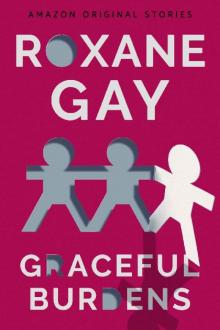 Graceful Burdens (Out of Line collection)
Graceful Burdens (Out of Line collection)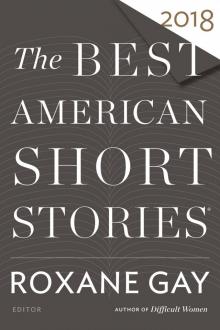 The Best American Short Stories 2018
The Best American Short Stories 2018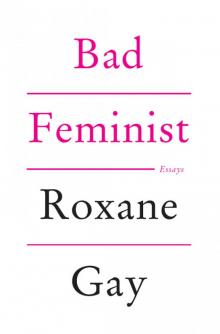 Bad Feminist
Bad Feminist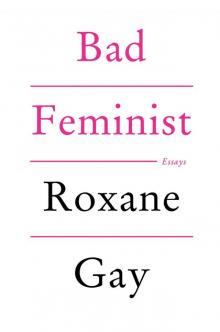 Bad Feminist: Essays
Bad Feminist: Essays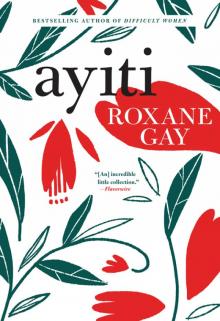 Ayiti
Ayiti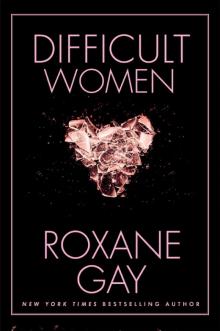 Difficult Women
Difficult Women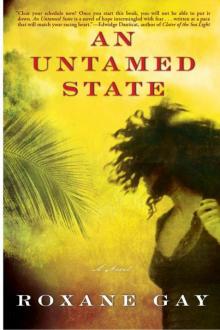 An Untamed State
An Untamed State Hunger
Hunger